- Clone
- 2A9/Ikaros (See other available formats)
- Regulatory Status
- RUO
- Other Names
- IKAROS family zinc finger 1, DNA-binding protein Ikaros
- Isotype
- Mouse IgG1, κ
- Ave. Rating
- Submit a Review
- Product Citations
- publications
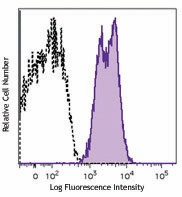
-

C57BL/6 mouse splenocytes were treated FOXP3 Fix/Perm Buffer Set, and then intracellularly stained with Ikaros (clone 2A9/Ikaros) Alexa Fluor® 647 (filled histogram) or mouse IgG1, κ Alexa Fluor® 647 isotype control (open histogram).
| Cat # | Size | Price | Quantity Check Availability | Save | ||
|---|---|---|---|---|---|---|
| 653305 | 25 µg | 137€ | ||||
| 653306 | 100 µg | 306€ | ||||
Ikaros family members, including Ikaros and Helios, play a role in the development of lymphocytes and B and T cells. They are nuclear factors that colocalize with DNA replication machinery components in higher-order chromatin structures and respond to signaling events, such as T cell activation. Helios and Ikaros bind to similar DNA sequences, and they function as hemopoietic-specific transcription factors. Members of the Ikaros family contain zinc-finger domains that are involved in DNA-binding and in the formation of homodimers and heterodimers between Ikaros family members. Expression of Ikaros is primarily detected in the thymus and spleen, where it is essential for regulating T cell specific gene transcription and for the differentiation and commitment of early hemopoietic progenitors to the B and T lymphoid lineages. Ikaros and Helios also appear to regulate cell cycle entry by inducing transcriptional repression under varying conditions and, thereby, mediate T cell activation and IL-2 mediated signaling events.
Product DetailsProduct Details
- Verified Reactivity
- Mouse
- Antibody Type
- Monoclonal
- Host Species
- Mouse
- Immunogen
- N-terminal half of mouse Ikaros fused to GST.
- Formulation
- Phosphate-buffered solution, pH 7.2, containing 0.09% sodium azide.
- Preparation
- The antibody was purified by affinity chromatography and conjugated with Alexa Fluor® 647 under optimal conditions.
- Concentration
- 0.5 mg/ml
- Storage & Handling
- The antibody solution should be stored undiluted between 2°C and 8°C, and protected from prolonged exposure to light. Do not freeze.
- Application
-
ICFC - Quality tested
- Recommended Usage
-
Each lot of this antibody is quality control tested by intracellular immunofluorescent staining with flow cytometric analysis. For flow cytometric staining, the suggested use of this reagent is ≤0.1 µg per million cells in 100 µl volume. It is recommended that the reagent be titrated for optimal performance for each application.
* Alexa Fluor® 647 has a maximum emission of 668 nm when it is excited at 633 nm / 635 nm.
Alexa Fluor® and Pacific Blue™ are trademarks of Life Technologies Corporation.
View full statement regarding label licenses - Excitation Laser
-
Red Laser (633 nm)
- Application Notes
-
Additional reported references (for the relevant formats) include: immunofluorescence1 and immunoprecipitation2.
Does not cross-react with human.
This clone is not recommended for ChIP (Chromatin Immunoprecipitation) assays (as determined by in-house testing).
View more applications data for a different format of this clone in our Scientific Poster Library.
This product is for research use only, cannot be used on or in humans, and is not to be used for commercial purposes. Use of this product to produce products for sale or for diagnostic, therapeutic or drug discovery purposes is prohibited. In order to obtain a license to use this product for commercial purposes, contact the Regents of the University of California. -
Application References
(PubMed link indicates BioLegend citation) -
- Cobb SB, et al. 2000. Genes & Dev. 14:2146. (IF)
- Hahm K. et al. 1998. Genes Dev. 12:782. (IP)
- Andricovich J, et al. 2016. J. Clin. Invest. 126:905. (ICFC) Pubmed
- Product Citations
-
- RRID
-
AB_2563162 (BioLegend Cat. No. 653305)
AB_2563163 (BioLegend Cat. No. 653306)
Antigen Details
- Structure
- Belongs to the Ikaros C2H2-type zinc-finger protein family. Contains 6 C2H2-type zinc fingers. 519 amino acids with predicted MW of 58 kD.
- Distribution
-
Nucleus. Abundantly expressed in thymus, spleen and peripheral blood leukocytes and lymph nodes. Lower expression in bone marrow and small intestine.
- Function
- Transcription regulator of hematopoietic cell differentiation. Plays a role in the development of lymphocytes, B and T cells.
- Interaction
- Heterodimer with other IKAROS family members.
- Cell Targets
- Component of the chromatin-remodeling NuRD repressor complex which includes at least HDAC1, HDAC2, RBBP4, RBBP7, IKZF1, MTA2, MBD2, MBD3, MTA1L1, CHD3, and CHD4. Interacts directly with the CHD4 component of the NuRD complex.
- Biology Area
- Cell Biology, Chromatin Remodeling/Epigenetics, Transcription Factors
- Molecular Family
- Nuclear Markers
- Antigen References
-
1. John LB and Ward AC, 2011. Mol. Immunol. 48:1272.
2. Merkenschlager M, 2010. FEBS Lett. 584:4910.
3. Thomas RM, et al. 2010. J. Biol. Chem. 285:2545.
4. Papathanasiou P, et al. 2009. Stem Cell. 27:3082.
5. Molnar A, et al. 1996. J. Immunol. 156:585. - Gene ID
- 22778 View all products for this Gene ID
- UniProt
- View information about Ikaros on UniProt.org
Related FAQs
Other Formats
View All Ikaros Reagents Request Custom Conjugation| Description | Clone | Applications |
|---|---|---|
| Purified anti-mouse Ikaros | 2A9/Ikaros | WB,ICC,IP |
| PE anti-mouse Ikaros | 2A9/Ikaros | ICFC |
| Alexa Fluor® 647 anti-mouse Ikaros | 2A9/Ikaros | ICFC |
Customers Also Purchased
Compare Data Across All Formats
This data display is provided for general comparisons between formats.
Your actual data may vary due to variations in samples, target cells, instruments and their settings, staining conditions, and other factors.
If you need assistance with selecting the best format contact our expert technical support team.
-
Purified anti-mouse Ikaros
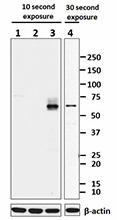
Total cell lysate from Daudi (lane 1, 15 µg), Jurkat (lane 2... -
PE anti-mouse Ikaros
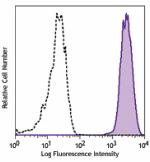
C57BL/6 mouse splenocytes were fixed and permeabilized with ... -
Alexa Fluor® 647 anti-mouse Ikaros
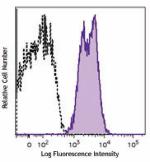
C57BL/6 mouse splenocytes were treated FOXP3 Fix/Perm Buffer...
 Login / Register
Login / Register 









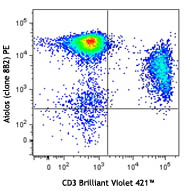
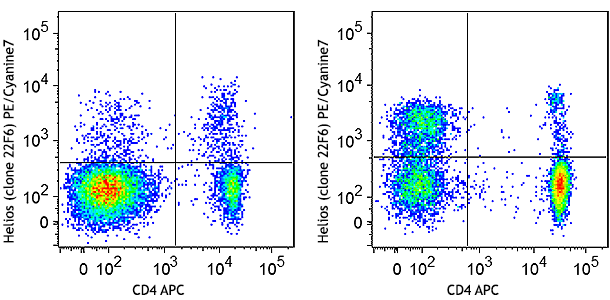
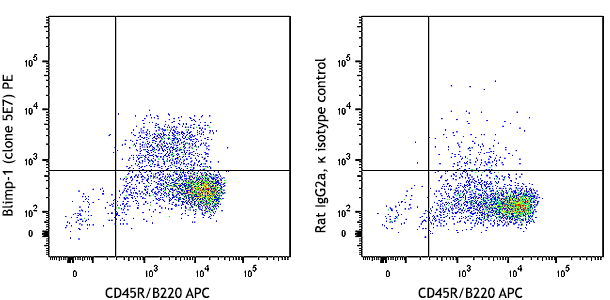




Follow Us